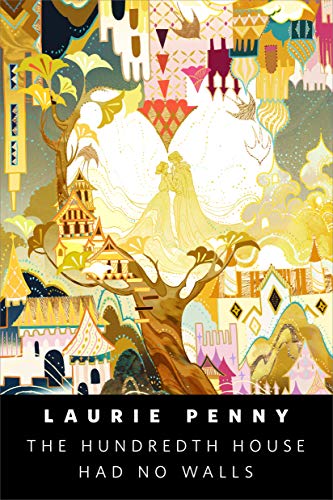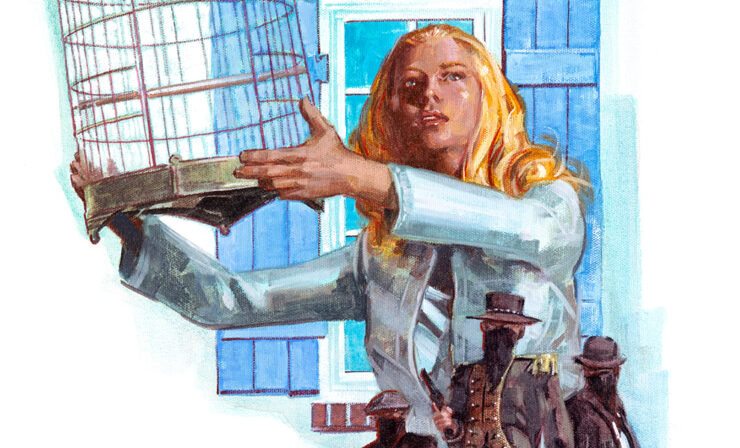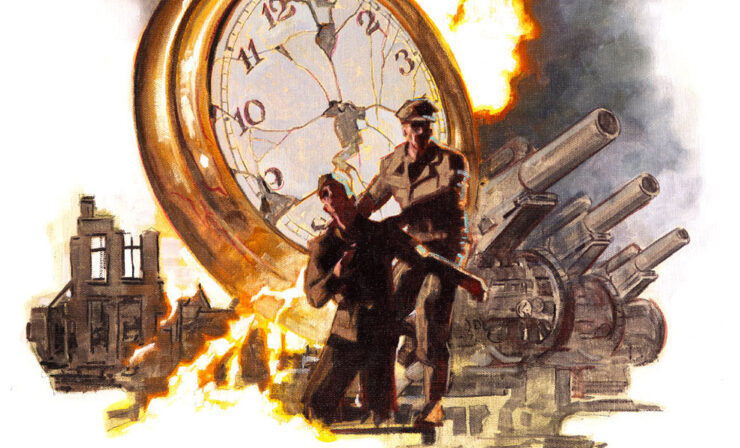A new story by Laurie Penny.
The King was bored.
For five hundred years he had been King of the country of Myth and Shadow, and he was a good king, if a slightly bewildered one. The countryside rolled with treacherous forests rammed full of all the requisite enchanted creatures, and stories grew wild and weird in the fields. The people were happy, even when they had to chase their idle daydreams out of the back garden with a broom.
The King lived in a huge palace that he had dreamed into being all by himself, full of dark, mysterious corners and fierce, beautiful courtiers and lovely young women with dark hair and flashing eyes who could dance on their points for a day and a night and never set a foot fully on the ground. The King appreciated all of it. He had designed it for his own appreciation. Still, he was bored.
He could summon a few of the lovely young women to sing and dance for him and perhaps see to some of his less strictly aesthetic needs—but that was just too easy, and anyway it always made him feel a bit awkward.
Buy the Book


The Hundredth House Had No Walls
He could wander down to the Fields of Fancy and go on an absolute rager eating fairy fruit, and that might distract him for a decade, but it always gave him a brutal hangover.
He could do some work. Being the King of Myth and Shadow wasn’t a lazy man’s job. The stories weren’t just going to write themselves—except, more and more, they seemed to.
The King was bored, bored, bored. He had everything a King could want, and he was still horribly, horribly bored.
He had never quite intended to become King. That was why he was good at it. When he had first arrived in the Kingdom, it was a grey and anodyne country, and he was a simple travelling bard and sometime sorcerer looking to make his name.
In fact, the bard thing had been the original plan. The King of Myth and Shadow, before he became the King, was the seventh son of a seventh son, which wasn’t a big deal, really, and he didn’t like to talk about it, although it did prove handy on the road when busking fell flat to be able to magic yourself up a serviceable tent and a hot meal just by wishing it.
Barding was the job of choice for enterprising young men with good hair who wanted to see the world, back when the world and the King had both been so much younger. When he came to the grey and anodyne country, all flat marshes and chalk skies, he stopped at the first inn, got out his harp and started pounding out a cover of ‘Venus in Furs’.
He hadn’t even finished the song when the villagers begged him to tell them a story instead.
‘It’s not that you can’t sing,’ said the innkeeper’s wife, who was a kind and thoughtful person. ‘It’s just that we don’t get a lot of stories around here these days.’
‘You don’t?’ said the young king, who was not yet the King. ‘But I thought this was the land of Myth and Shadow?’
‘It was, once,’ said the innkeeper’s wife, who was really too kind and too thoughtful to be stuck running an inn for a dull man who did not appreciate her. ‘But as you can see, the Fields of Fancy are all blighted. We’re lucky if we can harvest a couple of decent parables between us. The fairies and goblins are leaving the forests. As for shadows, there are hardly enough to fill the corners anymore. All the kids are moving to the city to become accountants.’
‘Times are hard,’ the villagers agreed.
‘Alright,’ said the young king, and he started to tell a story about a storm of inspiration that rolled through a grey and lacklustre land, raining all sorts of wild notions down on the fields.
Immediately, a great gust of wind rattled the shutters, and the villagers ran to bring in the picnic tables.
‘How did you do that?’ cried the innkeeper’s wife. ‘It’s raining free verse out there!’
‘It’s just a talent I have. It’s no big deal,’ said the young king, although he was secretly rather proud, and pleased to have made everyone so happy.
‘Can you do it again?’
‘Sure,’ said the young king, and he started to tell a story about doorways that opened to stranger lands where elves and centaurs and unicorns and vampires and witches and all the less popular long forgotten creatures had retreated, bringing them back to the grey country.
Instantly, the door flew open, and a harried farmer rushed in demanding strong drink on account of a griffon having taken up residence on his roof.
‘That was brilliant!’ said the innkeeper’s wife, putting the kettle on for some nice hot tea, because the young man was working hard and starting to look a bit peaky.
‘Watch this,’ he said, and he started to tell another story, all about a herd of wild shadows wheeling in from the North and taking up gloomy residence in the forests and crannies and all the too-bright places in the land.
And that, too, was suddenly so.
After a while, the people of the no longer grey and anodyne country asked the young sorcerer to become their king.
‘In principle, of course,’ he said. He had heard a lot about kings, mad kings and bad kings and kings who were worse still by virtue of sheer spineless incompetence, and while he didn’t know if he’d do a better job, he certainly wouldn’t do a worse one. ‘But shouldn’t there be some sort of election?’
‘No,’ said the innkeeper’s wife, who by this point was also the young sorcerer’s personal assistant, because he worked very hard, but sometimes forgot to eat breakfast. ‘That’s rather the point of Kings. If you want my advice, just give the people what they want. You’re good at that.’
‘My life is generally better when I take your advice,’ said the young sorcerer. And so he became king, and built the palace, and the land of Myth and Shadow continued to prosper.
Ten years passed, then twenty, then all at once five centuries had gone by and the King still hadn’t run out of stories. They came to him easily as breathing and dying and falling in love seemed to come to everyone else. Any time he wanted a new lover, a new toy, a new wing for his palace of Shadows, he simply thought about it and it happened. This, too, made the King feel awkward.
But more than that, he was bored.
He was bored of being rich and brilliant. He was bored of new lovers and new toys and bored of his palace, and he knew he shouldn’t be—after all, he had been so very lucky. Any of his subjects would have killed for his problems. Somehow that only made it worse.
So the King decided to do what kings do in these situations and go and wander the world in disguise as a normal, non-royal person. He took only a small entourage—just twenty Knights of Wild Notion, plus their ostlers, servants and squires most of whom, as is traditional, were actually girls dressed as boys. It was really a very modest retinue, and the King could not understand what the fuss was about when they piled off the Acela Express at Penn Station.
The King had never really believed in New York City.
More precisely, he had always imagined it was no more or less a true place than the Fields of Fancy or the Forest of Wonder and Moderate Peril: a place sustained entirely by the belief of its citizens and the untold millions of dreamers who willed it into being every morning.
When he arrived, he found that this was true. New York was no less impressive for being mostly fictional. Of course, the place was lousy with writers.
The King felt right at home.
After a pleasant morning bothering the penguins in Central Park Zoo and a less pleasant afternoon getting hassled by tourists on the High Line, all of whom seemed to want his picture, the King found his way to a cabaret bar in the East Village.
He shuffled into the back with his Knights and ordered a cup of tea. The barman was about to explain that he did not serve tea when he was surprised to find himself in possession of a very fine earthenware tea set and a big jar of Assam.
The King sipped his tea, which was very good, and settled down to watch the show.
That was when he saw her.
Her hair was a rage of upstart red.
Her eyebrows were inexplicable.
Her dress fell from her shoulders in rolls of dirty white silk.
Her voice was rich and dark and angry, like just hearing it could crack open your chest and whistle through all the hardened dirt in the forgotten corners of your heart.
She was alone on stage. Just her and a piano. She played it as if she was trying to rip the song from its teeth, and the song was raw and true.
The King listened. His tea went cold.
The King came backstage after the show, after telling the doorman a story about a doorman’s wife who was about to be treacherously discovered in bed with a doorman’s sister. He didn’t like doing that sort of thing, but needs must when you’ve just met your future bride.
There was a sign on her dressing room door. It read:
The Princess of Everywhere and Nowhere.
She was draped across an old couch, smoking a cigarette. Without the clownish makeup she was even more beautiful, her face a mess of exquisite angles, scrubbed bare and vulnerable.
‘How did you get into my dressing room?’ she asked.
‘I’m a sorcerer,’ admitted the King. ‘It’s what I do.’
‘Well,’ said the Princess, ‘since you’re here, you can get me a water from the fridge. Don’t I know you from somewhere?’
‘It’s possible,’ said the King of Myth and Shadows, handing over the water. ‘You might have read about me in an old storybook, or met me one day in a dream.’
‘I don’t think so,’ said the Princess. ‘I mostly dream in music. Oh, I know! It was an interview in Vice.’
‘Or that,’ said the King, who had become uncommonly shy. ‘I like your singing.’
‘Thanks,’ said the Princess. ‘I like your hair. What was it that you wanted?’
‘I wanted to invite you to walk with me through the endless Marshes of Unfinished Plots, where it is always a yearningly perfect late spring morning, and listen to the songs of the forgotten muses, and be my consort for a year and a day.’
Instead, they went to a sushi restaurant on St Mark’s.
The Princess ordered yellowtail sashimi, so the King did, too.
‘How did a Princess end up playing piano in the East Village?’ he asked, spearing a piece of fish.
So the Princess told him.
‘I was born a princess,’ said the Princess. ‘No slippers or spinning wheels involved.
‘My parents lived in a palace full of every toy a little girl could ever dream of, and it pleased them to see me play with them. More than anything, though, they liked my sisters and I to play with the dollhouse.
‘It was a beautiful dollhouse, built to look like a real castle, with a ballroom and a kitchen and working lights, and a tiny wooden princess to move between the rooms. She was skinny as the sticks she was made of and she could sit up at the dining table or lie down on the bed or stand propped up against the wall on her tiny stupid feet, but she couldn’t run or dance or talk, and she was all alone.
‘I hated that dollhouse. I felt so sad for the little wooden princess who was imprisoned there. I would steal her out of the dolls’ house and keep her under my pillow so she could go adventuring with me in my dreams. I took her with me secretly to play my parents’ piano, which stood all alone in the great ballroom, untouched and unloved. But my parents were worried. A princes shouldn’t shout and scream and tear strange sexy music out of innocent orchestral instruments. A princess should play quietly with dollhouses. How else will she learn to keep her own house when she’s a grown-up queen?
‘So they built me another dollhouse. And then, when I hated that one too, another. There was a townhouse and a cottage and even a saloon, which the little wooden princess did enjoy for a while, but soon we got bored again. Eventually the palace was full of dollhouses, sprouting everywhere like sad wooden mushrooms, gathering dust. I hated all of them.
‘I was bored of being a princess, and all the things you had to learn to do—eat with your mouth shut, speak softly, suck in your belly. And the list of things you had to learn NOT to do covered almost all the fun stuff.
‘So one day I went out to the forest and set the little wooden princess free. Finally, she stood up and stretched on her wooden feet and spun and danced and told me she would miss me before she disappeared forever into the underbrush.
‘When I came home I told my parents I was leaving to become a cabaret singer. They were furious. Their rage ran red and hard and loving and I caught it in a silver dish and used it to dye my hair over the sink. Then I packed some spare knickers and ran off to Boston to start a band.’
‘Why?’
‘I was bored. I hate to be bored.’
‘I can relate,’ said the King.
‘What’s your real name?’ asked the Princess.
The King was momentarily bewildered. Nobody had called him anything but ‘Your Majesty’ for at least a century.
‘I can’t quite remember,’ said the King, ‘but I think it’s Colin.’
‘I’m Melanie,’ said the Princess.
The King thought that was the most beautiful name he had ever heard.
‘Want to get a hotel room?’ she said.
And for the first time in a very long time, the King was not the least bit bored.
The next night, the King was back at the bar before the band even started getting set up. The Princess of Everywhere and Nowhere was doing sound-checks with an upsettingly handsome drummer.
‘Can I help at all?’ asked the King.
‘Plug in that amp for me,’ said the Princess.
The King fiddled with the amp for forty-five minutes until someone took it away from him.
The next day, over breakfast in a run-down diner, the King asked the Princess to marry him.
‘Honestly, I’m flattered,’ said the Princess. ‘But I’m not really into the whole marriage thing.’
Nobody had said no to the King in a long time.
‘If you come to the land of Myth and Shadow as my Queen, we can feast together all day and night on every sort of sushi your heart desires. I will give you ten beautiful maidens to wait on you and ten handsome swordsmen to guard you and a golden piano to play, and you will enchant all the creatures of my land with your music as you have enchanted me.’
The Princess looked intrigued, so the King raised his game. ‘You will sleep on a bed of spider’s silk,’ he said, ‘and I will dress you in gowns of spun starlight.’
‘I’ve been dressing myself since I was six,’ said the Princess.
‘And aren’t you sick of it?’
‘You’re a very strange man,’ said the Princess. ‘I like it. I have to head back to the studio, but text me, ok?’
The King went back to his castle, gathered his most tenacious shadows about him and prepared for a sulk that would go down in legend.
She’s just a girl, he thought to himself. There are others.
But a chill wind of pathetic fallacy was blowing hard over the storyfields, and it whispered: you’re an idiot, and you’re kidding yourself.
‘What do I do?’ the King wailed at the innkeeper’s wife. ‘There’s nothing here she wants.’
‘Oh, you foolish man,’ said the innkeeper’s wife, who was no longer married to the innkeeper, and now ran a small vegan cafe in town. ‘She doesn’t want any of your treasures. She just wants you.’
The next night, when the show was over and all the hangers-on had finally left the party in the hotel lobby, the King climbed into bed. He curled his body around Melanie and started to tell her a story about a princess who grew up to be a cabaret singer, and a King who fell in love with her.
The King was nervous, because he’d never told this sort of story before. For one thing, the narrative structure was all wrong. For another, it had no ending to speak of, not yet, maybe not ever.
‘Once upon a time,’ said the King.
His mouth was very close to her face. Her hair smelled of cigarettes and vanilla.
The King of Myth and Shadow was no different from the rest of us in that he preferred stories to real life, which was messy and full of plot holes and disappointing protagonists. You couldn’t count on real life to deliver a satisfying twist, just more complications and the random violence of everyday heartbreak.
But he carried on telling the story, whispering it in Melanie’s ear as her eyelids fluttered closed.
‘This one’s good,’ she whispered. ‘This one’s my favorite.’
They were married in New Orleans, on the Southern leg of her tour.
When it was done, the King took the Princess back to the land of Myth and Shadow, and dreamed up a whole new wing of the castle just for her.
Since the King had a whole kingdom and the Princess was living out of a tour bus, it made sense that she would move in. She brought her own retinue, a crowd of lost boys and girls with wild hair and weird ideas who liked to dress in stripes and lace and drape themselves listlessly across the furniture between sets.
‘Where does she find them all?’ said the innkeeper’s wife, who by now was living in a small cottage near the palace with a nice woman named Carol who liked to go hiking on Saturdays.
‘They follow her home like cats,’ said the King. ‘She doesn’t have the heart to turn them away.’
The innkeeper’s wife saw to it that little dishes of cream and vodka were left at strategic points around the palace, and the lost boys and girls were well pleased.
After a few weeks, though, the Princess became restless. She stopped eating her sushi at breakfast. She stopped speaking to the King at dinner. Great stormclouds of dramatic tension boiled over the land, and the lost boys and girls of the Princess’ court and the King’s Knights of Wild Notion hid in the cellar and behind the curtains and under the table to wait for the weather to get a bit less metaphorical.
‘What’s wrong?’ the King asked the Princess, after three days of dreadful silence.
‘It’s the house,’ said the Princess. ‘It’s so big and so beautiful, but it makes me feel like a wooden doll in a display case.’
‘But I dreamed up a recording studio for you,’ said the King. ‘Don’t you like it?’
‘Of course I like it,’ said the Princess, ‘but I like the road better.’
The King thought and thought. He couldn’t let the Princess be unhappy. When she was unhappy, he was unhappy, and when he was unhappy, the Kingdom was unhappy. If she was unhappy in the Kingdom, she must be unhappy with him.
Eventually, he hit upon a solution.
‘I will build the Princess a new palace,’ announced the King.
And so it was done. The new palace was next door to the old one, with a gleaming pathway cut between the limerick grasses that grew wild on the mountainside. It was even more beautiful than the first. Its turrets were spun out of lost screenplays and its galleries were haunted by the mournful ghosts of singer-songwriters who never quite made it big. The King was sure that the Princess would be happy now.
And she was, for a time. The Princess liked newness, and adventure, and she recorded a well-received album in the basement of the new palace. But after a few weeks, she became restless again.
The King thought and thought. ‘If she doesn’t like this one, I’ll build her another,’ he said to the innkeeper’s wife, who put her head in her hands.
‘I know you’re trying to be romantic, but you’re approaching the question of female agency all wrong,’ she said.
‘What makes you think that?’ said the King.
‘Well, for instance,’ said the innkeeper’s wife. ‘I don’t even get a name in this story.’
‘How is that my fault?’
The innkeeper’s wife looked at the King for a long time without saying anything.
‘Alright,’ sighed the King. ‘I’ll put it on my to-do list. Right now, I’ve got a palace to build.’
The next palace was an enormous treehouse, built into the branches of the three tallest redwoods in the forest. The court had to be winched up in buckets or flown up on the backs of griffons, as there were no stairs to speak of, and an elevator would have spoiled the look of the thing. Walkways strung with fairy lanterns connected all the passageways, and the wind whispered dirty, earthy lyrics as it muttered through the leaves. Ravens and starlings and bright birds of paradise nested in the high eaves, and great dances were held on platforms in the canopy, where you could see the whole Kingdom sparkling in the endless starlight.
‘It’s great,’ said the Princess, ‘it’s really great. Let’s spend the week here.’
‘I was hoping you’d want to spend your life here,’ said the King.
‘Let’s come back to that question,’ said the Princess, taking him by the hand and leading him to bed.
By the end of the year, the King had built the Princess ninety-nine houses.
There were brutalist modern apartments and twee little cottages and cloud-castles built of the sharp, lovely dreams of underpaid academics who really wanted to be novelists. But still the Princess would leave, and go missing for days, and turn up in a dive bar a week later draped in reprobates and the obscene sweat of songwriting.
By the time she walked out of the ninety-ninth house, the King didn’t bother looking for her, and went to numb his heart for a little while in his library.
After a week, he was only a little bit worried.
After two weeks, the words swam and snickered on the page in front of him, and he couldn’t concentrate for worry.
By the end of a month, he was frantic. Where had she gone? What had he done wrong?
‘What is any of it worth,’ said the King, out loud, ‘if I can have everything I want, but I can’t have her?’
The words hung in the air like obscure art on a gallery wall, and the King had a great idea for a new story. He saw it all in his head. It would be a story about a boy, and a girl, and a kingdom, and a quest, and there’d be enough angst for a trilogy, and probably some sizzling gypsies.
The King picked up his pen.
The Princess put her hand down on the blank page. She stood beside him, and the room fell away, and they were on the steps of the castle, and the air crackled with electricity, and her rage was beautiful and terrifying.
‘Stop it,’ she said. ‘Stop that right now. I’m not a girl in one of your stories. Don’t you get it?’
‘I never thought you were,’ said the King.
The Princess raised one ineffable eyebrow. ‘So why do you keep trying to write me into one?’
‘Because I love you, and I don’t want to lose you,’ said the King.
She took his face in both her hands and kissed him.
‘I love you too much to let you write walls around me,’ she said.
‘But what sort of story can I write you into, if it isn’t one of mine?’
‘You can’t,’ said the Princess, folding her arms in a way that terrified the King more than he could possibly express. ‘I don’t want you to write me into any story. I want to make up my own story. You can be in it, if you like, but that’s all.’
‘That’s crazy,’ said the King. ‘Everyone knows my stories are the best. You’ll mess it up. You won’t get the ending right.’
‘Maybe so,’ said the Princess, ‘but I want to try.’
‘You’ll skip vital exposition,’ said the King. ‘You’ll put the plot twists in all the wrong places.’
‘I’m pregnant,’ said the Princess.
‘You see?’ said the King. ‘That’s exactly the sort of thing I’m talking about.’
Then he sat down on the castle steps and threw up into the geraniums.
‘Colin,’ said the Princess. ’Stop being such a drama queen. That’s my job.’
‘The hundredth house is my heart,’ said the King. ‘Will you live there, at least?’
The Princess started to cry.
‘I hate it when you do that,’ she said.
Then she kissed him again.
‘This isn’t ever going to get easier, is it?’ he asked, a very long time later, when they’d come up for air.
‘I hope not,’ said the Princess. ‘That would be boring.’
‘You know,’ said Colin, drawing her onto his lap, ‘in all my life, I never met a girl who could match me.’
‘That’s funny,’ said Melanie. ‘In all my life, I never met a boy who could catch me.’
She laughed, and it sounded like the first chord of the song you loved most when you were young and longing.
Then she ran.
The King followed.
It wasn’t the end.
Buy the Book


The Hundredth House Had No Walls
“The Hundredth House Had No Walls” copyright © 2019 by Laurie Penny
Art copyright © 2019 by Kuri Huang















That was delightful! Seriously, reading this just made my day. Thank you!
Oh…I *loved* this. Thank you.
I really like it.
This was truly a beautiful read! Thank you for this!
That was fantastic.
Oh god, this is ADORABLE.
A cute take on Gaiman and Palmer’s love story!
Melanie, I immediately thought of Neil and Amanda too!
what a great imagination
annnnd i die
Laurie Penny is magic
A king who was bored on the throne,
Would wring for his pleasure alone;
A nosy young courtier
Proposed something naughtier:
“I’m thinking, my lord, ‘Hide the bone’!”
Oddly enough, the actors in my head were Neil and Amanda, too, which made it all the more magical. A very sweet fable.
Brilliant. Clever imagery, flowing narrative and valuable mesage.
This was wonderful! It had just the right touch of humor and heart. The elements of high fantasy parody killed me!
It seems that we all thought of Neil and Amanda immediately…
Isn’t art delicious?
<3
I heard echoes of Galaxy Quest in there, particularly with the innkeepers wife never getting a name. Nicely done. :)